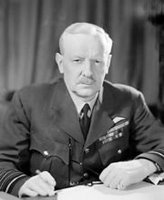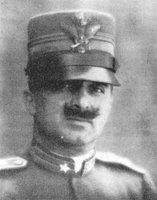You might need a subscription to read it, but the gist of the article is:
VICTORY is not a matter of seizing territory, Dan Halutz once explained. It is a matter of “consciousness”. And air power, continued Israel's chief of staff, affects the adversary's consciousness significantly. Indeed, the very concept of the land battle is “anachronistic”. Lieut-General Halutz, an air-force man, is said to have persuaded Israel's militarily inexperienced prime minister, Ehud Olmert, that the task of destroying Hizbullah in Lebanon was the perfect job for aircraft.
It did not quite work out that way. Yet the seductive idea that air power can provide swift victory with light casualties has been around almost as long as the aeroplane itself.
...
Israel was hoping, through its use of air power in Lebanon, not just to hammer an irregular guerrilla force; it was also seeking to put pressure on the Lebanese government and others to disarm Hizbullah and secure its southern border. In this General Halutz was said to have been strongly influenced by NATO's war of psychological pressure against Slobodan Milosevic, which aimed to force the Serb dictator to take a specific action—pull out of Kosovo and halt his ethnic cleansing—through an air campaign that kept ratcheting up the costs by destroying power plants, bridges, factories and other bits of infrastructure.
But, in the end, Israel found that even in a war that hinged on psychology and “consciousness”, air power had inherent limitations. In the 48 hours before the ceasefire went into effect, Israel sent a surge of ground troops into southern Lebanon to engage in the “anachronistic” pursuit of seizing territory—precisely in order to create the conscious perception of tangible military victory that air power alone had failed to deliver. The truly smart bomb remains as elusive as the silver bullet.
 I could have told them that. Oh, wait a minute, I did! Except that, rather than mentioning General Arthur "Bomber" Harris ad nauseum (the Economist is so Anglo-focused), I brought it back to Giulio Douhet, who really did invent the idea of winning wars through airpower alone.
I could have told them that. Oh, wait a minute, I did! Except that, rather than mentioning General Arthur "Bomber" Harris ad nauseum (the Economist is so Anglo-focused), I brought it back to Giulio Douhet, who really did invent the idea of winning wars through airpower alone. 
Come on, Economist! If you are going to talk theory, get your theorists right!
4 comments:
The difference between Arthur Harris and Douhet as theorists is that while Douhet was a pure theorist, Harris was a practitioner who came out of his experience convinced that the theory had worked.
Also, the other anachronism of Israel's military in this war (the reliance on armored forces) hasn't been commented on. It shouldn't go without saying that a damaged or destroyed armored vehicle costs a lot more than the ATG that took it out--and that this kind of cost isn't infinitely absorbable. Not even with all our tax dollars that are absorbing those costs.
Good points. The lesson in both Iraq and Lebanon so far seems to be that if you set out to win a war on the cheap, you won't win and it won't be cheap. I can see why the U.S. fell into that trap, but I'm surprised the Israelis did.
Also, while Harris was a practitioner, Douhet's mustache was still way cooler.
I've always found the Brits' view of Harris interesting, when compared to the American view of LeMay. Granted, Harris was a little more blatant about the deliberate targeting of civilians, with the American daylight bombing of German cities at least nominally aimed at military targets. But LeMay was pretty blatant about it with Japan. Nonetheless, Harris was somewhat shunned by "good society" after the war, while LeMay became the father of the U.S. Air Force. (Of course, you could argue we don't have a "good society" in the United States and, if we did, getting shunned by it is a necessary prerequisite to any budding political career.)
Yeah,that is some moustache.
As for LeMay, well...thank goodness for the highly controlled two-party system, otherwise maybe he would have had a shot at being President.
A lot of people think Harris was given an unfortunate shaft after the war. And, compared to LeMay,he did. I think it may have something to do with a recognition in Britain that they would have still have to live right next to the people Harris was firebombing. I think if LeMay had been incinerating Mexico City or Montreal...well, then again maybe we would still be pretty unapologetic about it. Never mind.
Post a Comment